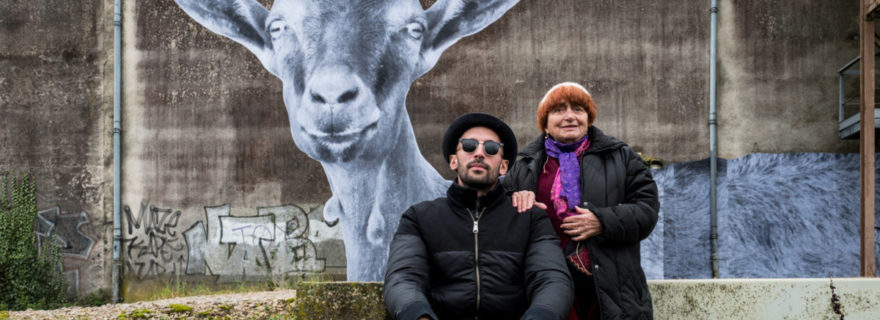'Faces Places'
Movie Rating:
3.5
For those who know the name Agnès Varda, her mere presence on screen promotes deep smiles of recognition and the knowledge that you’re in good hands. At 88, it’s amazing that she’s still making movies, especially ones as personal and downright magical as ‘Faces Places’.
One of the most important (and until recently, most unsung) members of the French New Wave, Varda is an art film icon and one of the most important female directors of all time. She’s also a filmmaker primarily obsessed by celebrating people and worlds rarely shown on screen, executed with a passionate affection that’s downright infectious.
At this point, it’s probably worth stating that the authorship of Varda’s latest documentary isn’t entirely her own. It’s a directorial collaboration with a young French photographer and filmmaker named only JR, who is young enough to be her grandson. Not that you’d know there was such a gap between the ‘Cléo from 5 to 7’ director and her sunglasses-sporting protégée/partner. JR’s work is primarily rooted in portrait photography blown up and plastered on buildings. The results are always striking, even more so when combined with Varda’s intentions. Together, she wants to take him on a road trip through rural France to work his magic on people who are rarely given a voice or even photographed, never mind this dramatically. After a whimsically quirky opening that introduces the pair through a mixture of staged conversations and observational moments, they pile into a big van painted to look like a camera and begin the good work.
The two travel around to small villages to find unique personalities who capture Varda’s imagination. Then the cameras come out and they blown the photos up big. It starts in an almost abandoned mining community where they create portraits and plaster them over a crumbling townhouse that used to house the workers. It’s a quirky yet beautiful ode to the nearly forgotten people. But Varda’s not done. She also finds a woman who still lives in the building and plasters her face along the side. The subject is moved to tears by the beauty of the project, and the artists suck up her joy and promise friendship. Then they pile into the literal camera van and the journey continues. They have loving chats with farmers about the nature of their work, the changing nature of the business, and how that affects the surrounding community. There’s nostalgia for lost joys, celebration of current triumphs, love, friendship and art, all mixed together. It’s all smiles all around, and then it’s back into the van and off to the next stop on the road trip.
If ‘Faces Places’ were merely a documentary ode to a side of France rarely seen and the beautiful traveling art project that Agnès Varda and JR dreamed up for the journey, it would be a delight. However, it’s even more than that. Varda always had a certain strain of autobiography within her work, which has become very prevalent in her later years. This movie isn’t just an ode to the wonderful French people who infatuate her and the peculiarly pretty art from JR. It’s also a personal expression. The movie liberally mixes documentary and stylized diary filmmaking throughout, breezing by with the gentle wistfulness of a dream. It captures the iconic filmmaker at a moment of reflection. She’s honest about her age and feels her once-sharp skills fading. She feels the need to capture memories her bursting mind can no longer contain and that her fading eyesight can no longer quite see. (The film often uses techniques to mimic her fading eyesight in ways both playful and poignant.) It’s a snapshot of an artist at a particular moment in her life as much as it is a snapshot of the communities that she visits.
The film also has another motivation that will surely thrill the cinephiles who know Agnès Varda’s name. Though his personality is completely different, JR looks remarkably like Jean-Luc Godard, especially given his tendency to never remove his sunglasses. Varda mentions this to the artist and also details her complicated relationship with Godard, someone whom she’ll always love as an artist, but has problems with as a person. Eventually, the road leads directly to Godard and a meeting between the two founding members of the French New Wave. The result? Too good to spoil, somewhat predictable but completely unexpected. It’s surprisingly moving, oddly funny, poetic, poignant and personal, while still being cinematic.
Those descriptors sum up Agnès Varda’s beautiful little movie as a whole. This isn’t a major work from the director, but it’s also tough to describe any of her films as major. That’s not what she does. That’s not who she is. If you do know and love what Agnès Varda makes and who she is, then ‘Faces Places’ is sure to be one of the most joyous cinematic treats of the year.



